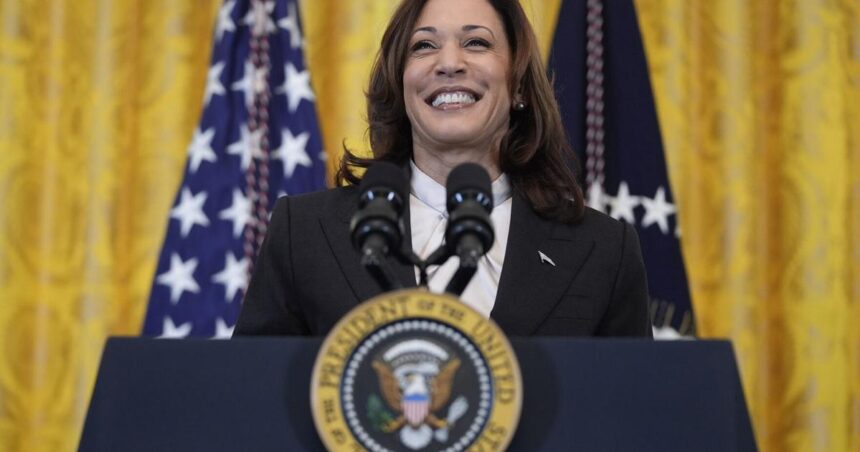WASHINGTON (AP) — She’s already made history, and now Kamala Harris could set new records after President Joe Biden unexpectedly withdrew his reelection bid and endorsed her.
Biden announced on Sunday that he was stepping down after a dismal debate performance raised concerns about the 81-year-old’s capability for a second term.
Harris is the first woman, Black person, and person of South Asian descent to hold the position of vice president. If she becomes the Democratic nominee and defeats Republican candidate Donald Trump in November, she would be the first female president.
Biden stated on Sunday that selecting Harris as his running mate was “the best decision I’ve made” and endorsed her as his replacement.
People are also reading…
“Democrats — it’s time to come together and beat Trump,” he wrote on X, the social media platform formerly known as Twitter. “Let’s do this.”
Harris praised Biden’s decision to step aside as a “selfless and patriotic act,” stating that he was prioritizing the American people and the country above all else.
“I am grateful for the President’s endorsement, and my goal is to earn and secure this nomination,” Harris said. “Over the past year, I have traversed the country, engaging with Americans about the critical choice in this historic election.”
Prominent Democrats swiftly rallied around Harris on Sunday following Biden’s lead. However, her nomination is not assured, and there have been talks about the party conducting a rapid “mini primary” to consider other candidates before its convention in Chicago next month.
A recent poll from the AP-NORC Center for Public Affairs Research revealed that about 6 in 10 Democrats believe Harris would excel in the top role. Approximately 2 in 10 Democrats doubt her, and another 2 in 10 have insufficient information to form an opinion.
The poll indicated that roughly 4 in 10 U.S. adults view Harris favorably, while about half have an unfavorable opinion.
A former prosecutor and U.S. senator from California, Harris’ own campaign for the 2020 Democratic presidential nomination encountered challenges before any primary votes were cast. Subsequently, she became Biden’s running mate but faced struggles in her early days as vice president. Responsible for migration issues from Central America, she came under fire from Republicans for problems related to illegal border crossings.
Nevertheless, Harris gained prominence as a vocal advocate for abortion rights following the Supreme Court’s overturning of Roe v. Wade in 2022. She has also played a pivotal role in engaging young people and voters of color.
Additionally, Harris’ consistent performance post-Biden’s debate misstep solidified her standing among Democrats in recent weeks.
Even prior to Biden’s endorsement, Harris was widely considered the frontrunner to succeed him on the ticket. With her background in foreign policy and national recognition, she holds an advantage over potential challengers like California Gov. Gavin Newsom, Michigan Gov. Gretchen Whitmer, and Pennsylvania Gov. Josh Shapiro.
Harris will aim to avoid the fate of Hubert Humphrey, who secured the 1968 Democratic nomination as vice president after President Lyndon Johnson opted out amid discontent over the Vietnam War. Humphrey ultimately lost the election to Republican Richard Nixon that year.
Vice presidents are always next in line to assume the presidency if the president dies or becomes unable to serve. However, Harris has faced intensified scrutiny due to Biden’s age. As the oldest president in history, taking office at 78 and declaring his reelection bid at 80, Biden’s age has raised concerns. In contrast, Harris is 59.
Addressing the issue of succession during an interview with The Associated Press in September 2023 while in Jakarta, Harris stated, “Joe Biden is going to be fine, so that is not going to come to fruition.” She added, “But let us also understand that every vice president — every vice president — understands that when they take the oath they must be very clear about the responsibility they may have to take over the job of being president.”
“I’m no different.”
Harris was born on October 20, 1964, in Oakland, California, to parents who met as civil rights activists. Growing up in her hometown and nearby Berkeley during the era of racial and social justice movements, Harris was deeply influenced by the activism around her.
She often recounted attending rallies in a stroller and being surrounded by adults “who spent full time marching and shouting about this thing called justice.” Integrated into Berkeley’s public education system in first grade as part of the second group to do so, Harris’ childhood shaped her values and perspectives.
Following her parents’ separation and being raised by her mother with her younger sister, Maya, Harris pursued her education at Howard University in Washington, D.C., a historically Black institution. She joined the Alpha Kappa Alpha sorority, which provided her with sisterhood and political backing over the years.
Post-graduation, Harris returned to the San Francisco Bay Area for law school and embarked on a career in prosecution, a decision that surprised her activist family.
Believing in effecting change from within the system rather than solely through external activism, Harris ventured into politics by challenging the incumbent San Francisco district attorney in 2003.
With minimal name recognition, Harris set up an improvised campaign table outside grocery stores, engaging with constituents. Her victory marked the beginning of a political journey characterized by independence and bold decision-making. Notably, she opted against pursuing the death penalty for the killer of a police officer in the line of duty early in her tenure, straining her relationship with law enforcement.
Nevertheless, this incident didn’t halt her political rise. By the end of 2007, while serving as district attorney, Harris was canvassing in Iowa for then-presidential candidate Barack Obama. Subsequently, after Obama’s election as president, he endorsed her in the 2010 race for California attorney general.
Once in office at the state level, Harris affirmed her commitment to upholding the death penalty despite personal reservations. She refused to support Proposition 8, a voter-approved measure banning same-sex marriage. Harris also played a significant role in a $25 billion settlement with the nation’s mortgage lenders following the housing crisis.
Amid increasing attention on police brutality toward young Black men, Harris implemented some reforms such as tracking racial data in police stops, though progressive critics demanded more aggressive actions like mandatory independent investigations into police shootings.
Harris’ tenure as a prosecutor would later draw criticism during her 2019 presidential bid from progressives and younger voters advocating for swifter change. Nonetheless, her close bond with Beau Biden, Joe Biden’s late son and then-Delaware’s attorney general, played a pivotal role in her selection as Biden’s running mate years later.
Married to entertainment lawyer Douglas Emhoff in 2014, Harris assumed the role of stepmother to Emhoff’s children, Ella and Cole, who affectionately called her “Momala.”
Harris seized a rare opportunity for political advancement when Sen. Barbara Boxer decided not to run for re-election in 2016 after over two decades in office.
As a senator, Harris swiftly became part of the Democratic resistance against Trump and gained recognition for her incisive questioning of his nominees. Notably, her intense scrutiny of now-Supreme Court Justice Brett Kavanaugh on government regulation of men’s bodies resonated with women and abortion rights activists.
Just over two years into her Senate tenure, Harris entered the 2020 Democratic presidential race. Despite internal conflicts within her campaign, she struggled to gain traction and withdrew before the Iowa caucuses.
Months later, Biden chose Harris as his running mate. In introducing her to the nation, Biden reflected on what her nomination signified for “little Black and brown girls who so often feel overlooked and undervalued in their communities.”
“Today, just maybe, they’re seeing themselves for the first time in a new way, as the stuff of presidents and vice presidents,” he expressed.
Associated Press writer Matthew Daly contributed to this report.
Copyright 2024 The Associated Press. All rights reserved. This material may not be published, broadcast, rewritten or redistributed without permission.





